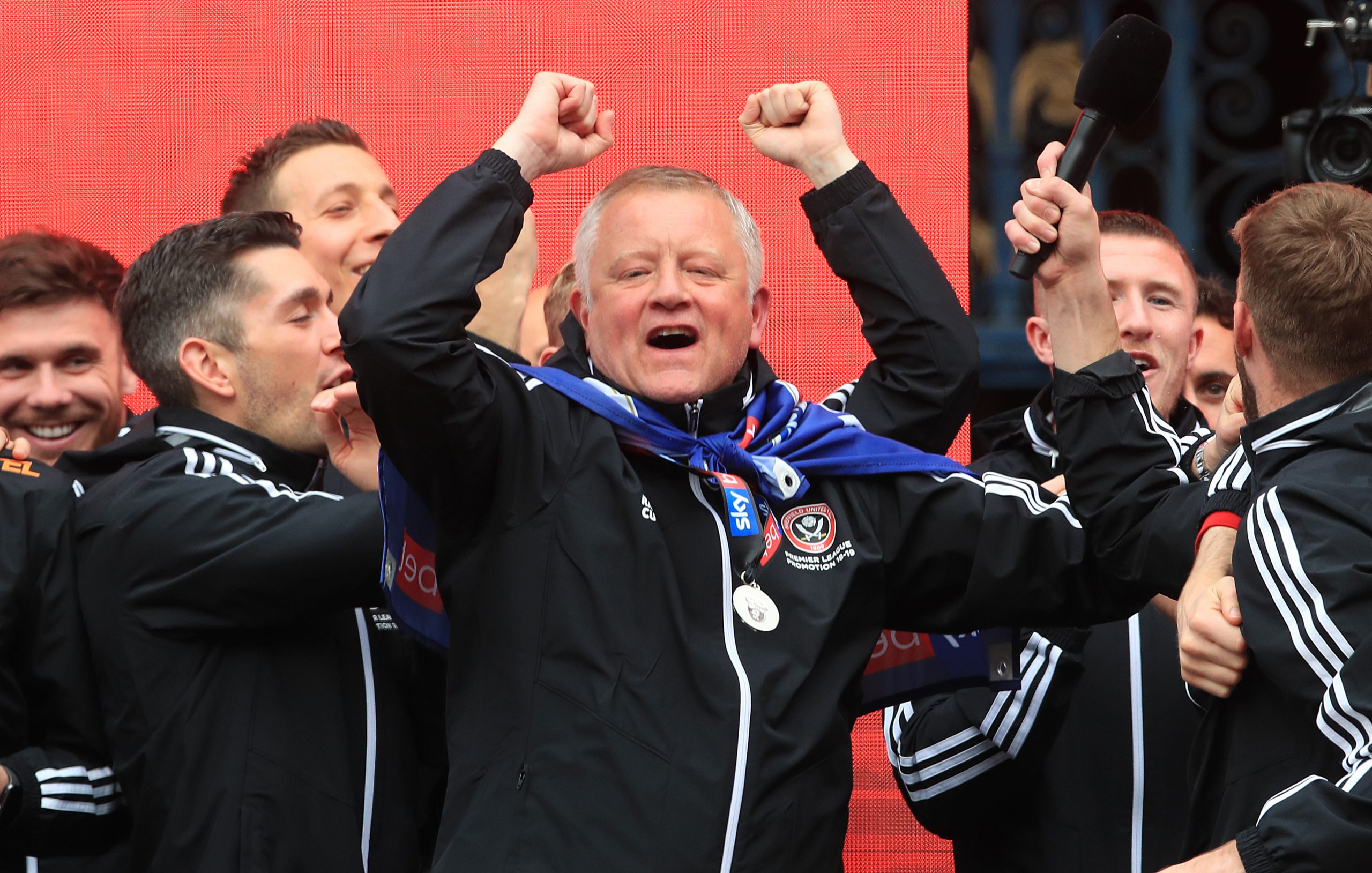A season of overachieving resources and confounding stereotypes was the story of Sheffield United’s promotion campaign. Hailing from the Steel City, the Blades’ success was more about their swagger than it was about the grit you might expect of their industrial roots. With an English manager in Chris Wilder, their play was more about intelligence and invention than it was about getting the basics right. The players, every single one of them of British or Irish nationality, played with verve and executed a style of play far more courageous than just knocking the ball into the channels. It’s exciting to see boyhood-blade Wilder get the chance to manage at the top level having unquestionably been the most successful manager of the EFL divisions in recent years. A sterling record of three promotions in four seasons starting with a League Two title at Northampton in 2015-16, followed by a League One title in his first season at Sheffield United in 2016-17 and, after falling short of the Championship play-offs in 2017-18, concluded with a 2nd place finish and promotion to the Premier League in 2018-19. It should also be said that only the League One side had a budget that suggested promotion would be the expectation. This is a man who took a Sheffield United side, heading nowhere fast, from League One to the Premier League in the space of three years. The success he’s brought and the style in which they’ve achieved it has not gone unnoticed by the educated eyes within the game either. When one of the most studied coaches of all time says this about you, you’re probably doing something right. “… the Sheffield United head coach is someone with new ideas and I have seen very few people with these ideas,” Marcelo Bielsa there.
Style & Build Up
Covering for the side’s lack of raw pace, the 3-4-1-2 was designed to create and maintain pressure on the opposition and a couple of the methods used to keep the game in the opposition half as much as possible are quite eye catching. First, the use of center backs as an extra attacker in possession. This was a regular occurrence and United’s most obvious form of overloading the opposition because of course a wing back, ball-side central midfielder and #10 combining to try and play through the defensive block just isn’t enough bodies. It really does have to be seen to be believed and with the likelihood that a more conservative style may be adopted in the top tier, we should take a moment to appreciate it whilst we can. 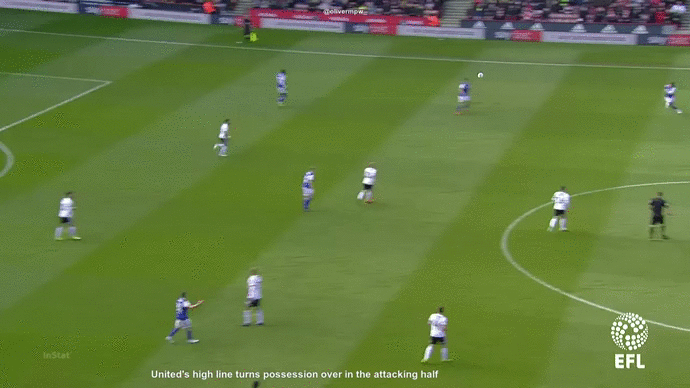 The numerical overloads created by this strategy have clear advantages in the attacking phase but they also served a key purpose in the defensive transition too, where United would look to immediately press should they lose the ball in the final third with the high number of players already around the ball making it an obvious strategy. You can see from their defensive activity map that, compared to the league average, the Blades were very active defenders high and wide up the pitch with the sheer numbers they’d often have in these areas a large reason why.
The numerical overloads created by this strategy have clear advantages in the attacking phase but they also served a key purpose in the defensive transition too, where United would look to immediately press should they lose the ball in the final third with the high number of players already around the ball making it an obvious strategy. You can see from their defensive activity map that, compared to the league average, the Blades were very active defenders high and wide up the pitch with the sheer numbers they’d often have in these areas a large reason why. 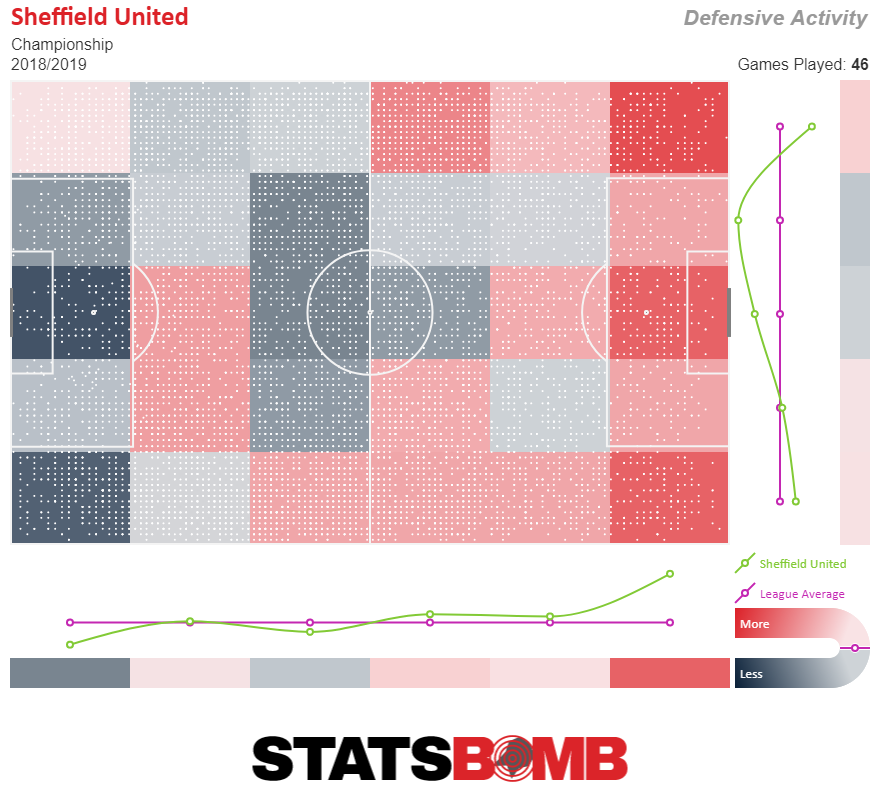 With Wilder’s system requiring a lot of positional and tactical intelligence from the players, one player excelled as the pivot and proverbial heartbeat of this Sheffield United side – Oliver Norwood. Securing his third straight promotion from the Championship (Brighton 16-17, Fulham 17-18), Norwood’s passing range and technique was crucial in stretching opponents and maintaining the pressure and momentum that Wilder cited as objective number one of his style of play. His passing sonar below highlights the range and frequency with which Norwood would spread the play.
With Wilder’s system requiring a lot of positional and tactical intelligence from the players, one player excelled as the pivot and proverbial heartbeat of this Sheffield United side – Oliver Norwood. Securing his third straight promotion from the Championship (Brighton 16-17, Fulham 17-18), Norwood’s passing range and technique was crucial in stretching opponents and maintaining the pressure and momentum that Wilder cited as objective number one of his style of play. His passing sonar below highlights the range and frequency with which Norwood would spread the play. 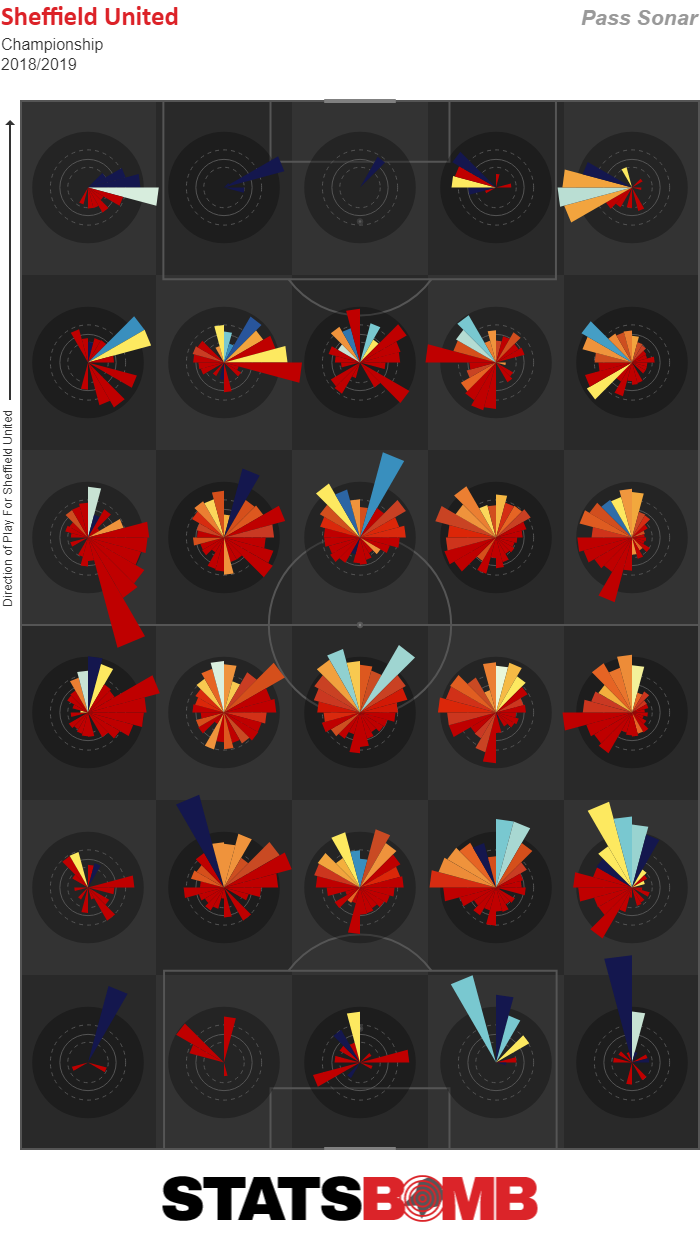 Not just captivating to watch though, their football was evidently highly successful. Statistically their approach throws up some really interesting trends when it comes to the chances they’d create and also the chances they concede, with wonderful symmetry at both ends. As you saw from the clip above, Sheffield United excelled at creating clear cut chances close to goal with the evergreen Billy Sharp often the main beneficiary, poaching most of his 22 non-penalty goals at the ripe old age of 33. The pressure created around the opponent’s goal and desire to get opportunities in the six -yard box is highlighted by the fact they led the Championship in the xG per shot and passes completed inside the box metrics, whilst they were 2nd in the league for the average shot distance they’d pull the trigger from.
Not just captivating to watch though, their football was evidently highly successful. Statistically their approach throws up some really interesting trends when it comes to the chances they’d create and also the chances they concede, with wonderful symmetry at both ends. As you saw from the clip above, Sheffield United excelled at creating clear cut chances close to goal with the evergreen Billy Sharp often the main beneficiary, poaching most of his 22 non-penalty goals at the ripe old age of 33. The pressure created around the opponent’s goal and desire to get opportunities in the six -yard box is highlighted by the fact they led the Championship in the xG per shot and passes completed inside the box metrics, whilst they were 2nd in the league for the average shot distance they’d pull the trigger from. 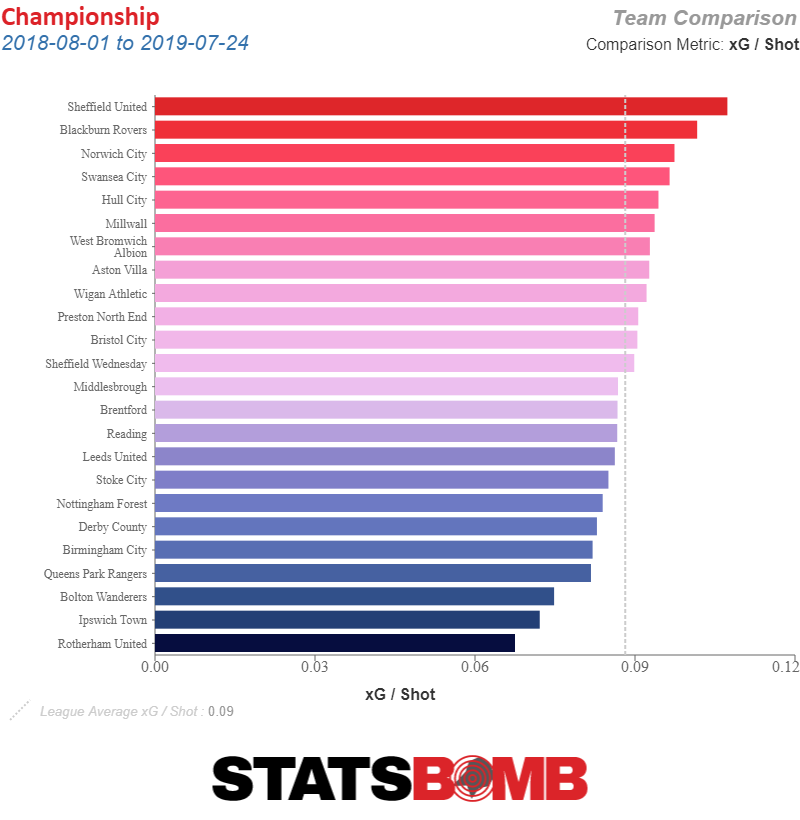 It was a similar story at the back, where the Blades ranked best in the league in xG per shot conceded and the average distance from goal of the shots they conceded was also furthest in the league.
It was a similar story at the back, where the Blades ranked best in the league in xG per shot conceded and the average distance from goal of the shots they conceded was also furthest in the league. 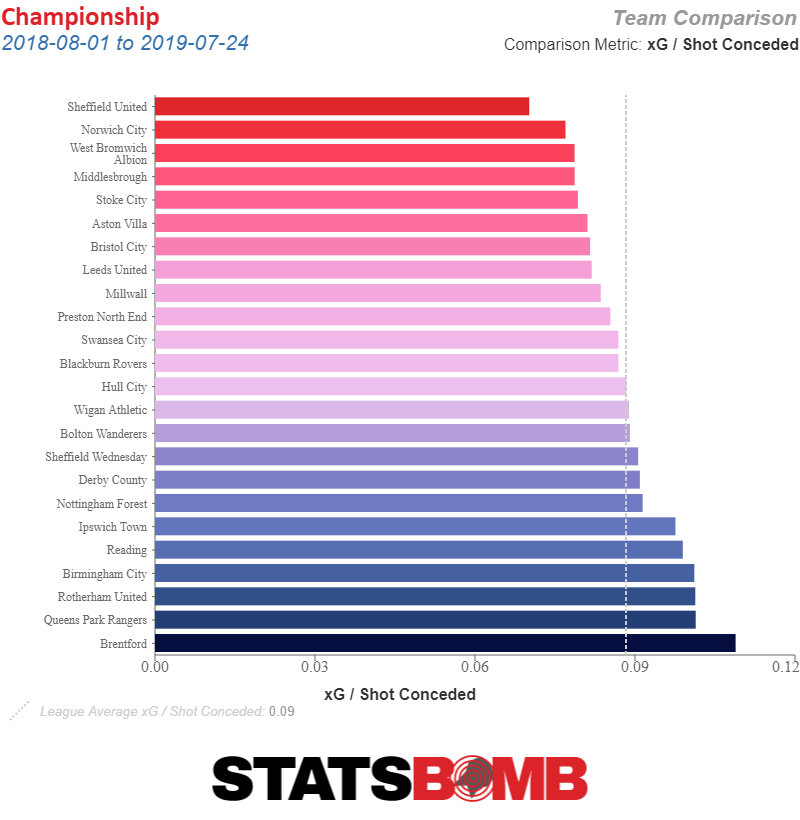 They were well drilled and effective in open play but their innovation at set plays, already written about previously, was a big factor in getting them over the line. The Blades were actually quite quiet on this front in the first two-thirds of the campaign, jostling themselves into the promotion picture on the back of their open play prowess with just six set play goals in the first 29 games (a rate of 0.20 per game) up to February 1st. From that date onwards though, they relied more on their set play invention to decide games in their favour with their set-play goals per game rate shooting up to 0.58 in the final 17 fixtures for a total of ten goals. Their strength and know-how in this phase of play could well be a tipping point in their avoiding relegation or not.
They were well drilled and effective in open play but their innovation at set plays, already written about previously, was a big factor in getting them over the line. The Blades were actually quite quiet on this front in the first two-thirds of the campaign, jostling themselves into the promotion picture on the back of their open play prowess with just six set play goals in the first 29 games (a rate of 0.20 per game) up to February 1st. From that date onwards though, they relied more on their set play invention to decide games in their favour with their set-play goals per game rate shooting up to 0.58 in the final 17 fixtures for a total of ten goals. Their strength and know-how in this phase of play could well be a tipping point in their avoiding relegation or not.
Transfers and Incomings
Despite promotion, Wilder is curiously still yet to delve into the foreign market to strengthen his side, preferring instead to pluck some of the better young performers from the Championship and other, predominantly British players who share a similar ravenous hunger possessed by his current squad to prove themselves in the Premier League. Though United aren’t expected to adopt an ultra-defensive philosophy, it’s clear they won’t be able to play the game as high up the pitch as they did against their 18-19 divisional rivals against much stronger opponents and it’s telling that most of their incomings so far have been in attacking areas, with homecoming Phil Jagielka the only defensive reinforcement at the time of writing. Acquiring a couple of “something out of nothing” players was high on Wilder’s shopping list for this transfer window and in Ravel Morrison and Callum Robinson they have two players that fit that bill. Morrison’s journey around the footballing globe and the possible reasons behind that have been well documented, but if Sheffield United can unlock the generational talent he possessed when coming through the Manchester United ranks, he could well make a positive difference in the same way he did before his sour departure from West Ham. In Robinson, the Blades have acquired one of the Championship’s better wide forwards and a player who adds not only pace but also the ability to create shots for himself and others off the dribble - something that simply didn’t exist in Sheffield United’s squad last season, though, in fairness, it wasn’t really required then. A more counterattacking and direct option is something that will solve a lot of problems the Blades are likely to encounter this season though and Robinson’s contribution in speeding up those attacking transitions, likely as a withdrawn forward in the 3-4-1-2, could be vital. Frenchman Lys Mousset is another who adds mobility to their front line and, at 23, crucially brings the average age of United’s attacking options down with their key attacking contributors last season – Billy Sharp (33 years old), David McGoldrick (31) and Mark Duffy (33) – all on the gentle decline of the age curve. Mousset’s motivations for joining the Blades are clear and twofold: to gloat about his European passport post-Brexit and to escape the substitutes bench, from which no fewer than 50 of his 58 Premier League appearances came. With only a select sample of minutes to draw firm conclusions from, this is a deal, like Ravel Morrison, made for the potential upside rather than any low-risk guaranteed contribution. And the upside is definitely there. Prior to his Bournemouth move in 2016 Mousset had just scored 14 goals for Le Havre in Ligue 2 and contributed to France U23’s run to the final of the Toulon tournament, attracting interest from some of the Premier League’s bigger names. Dean Henderson has signed on to keep goal in South Yorkshire for another year following a successful loan from Manchester United last season, whilst Ben Osborn and Luke Freeman have shown ability at Championship level and add versatility and depth to the squad.
Going Down With A Fight?
Going into this season it goes without saying that some adaptation to their cavalier methods will be required, with Wilder himself acknowledging that need, but even that may not be enough to save United from the drop. However, Wilder might model his approach on Eddie Howe and the way his Bournemouth side went about securing promotion to the Premier League and sticking to their expansive principles once there, suggesting perhaps those adaptations needn’t be as cautious as one might predict. That would certainly fit with Wilder’s character as a man not shy of puffing his chest out and forcing others to sit up and take notice. Make no mistake, this team will relish the prospect of turning up and spoiling the party for anyone who underestimates them. His legendary status at Bramall Lane also helps in this regard with his job secure even in the event of relegation and the freedom attached to having nothing to lose will very much aid their approach. The finer details may change, but don’t be surprised to see the unsuspected innovators innovate again. Header image courtesy of the Press Association
